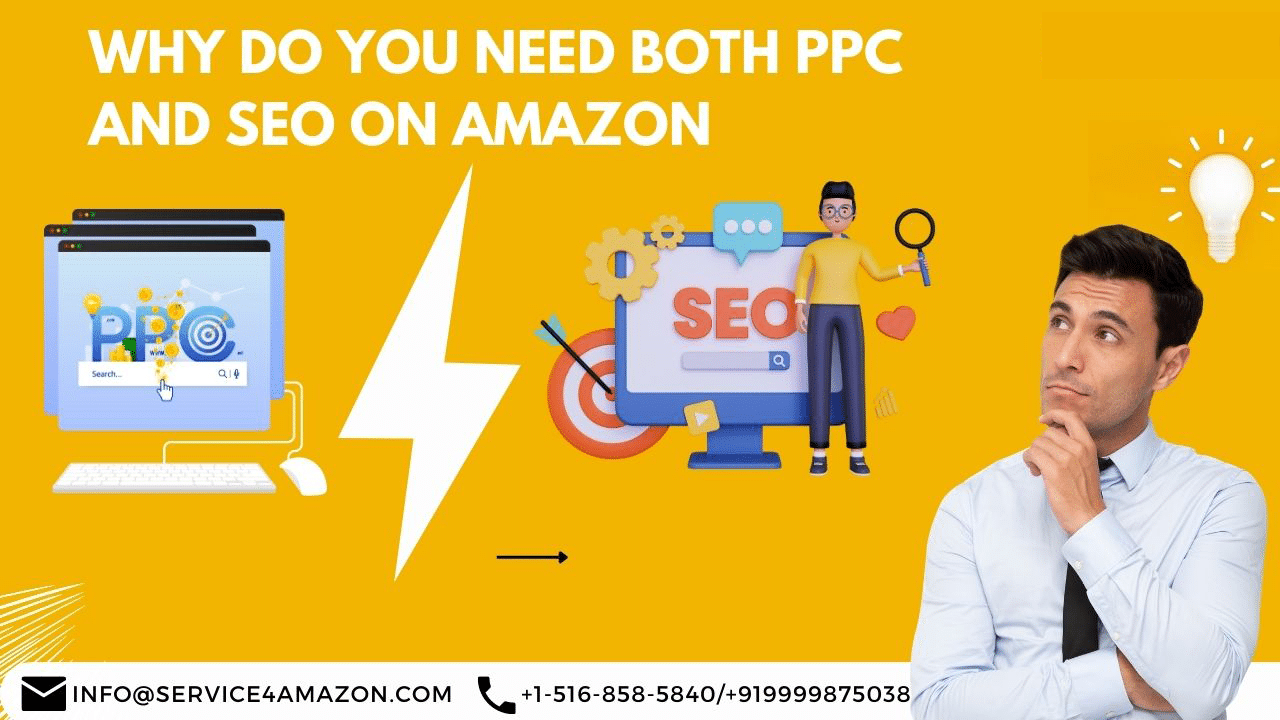On Amazon, almost 60% of consumers never scroll past Page 1. You are nowhere if you are not there. Without inclusion on this exclusive digital shelf, your market exposure and selling pace are at risk. Amazon SEO and Amazon PPC are key marketing techniques that sellers frequently employ to appear higher on search engine results pages.
Uncertain of what will work best for your Amazon business?
In this blog post, we’ll examine both of them in detail, offer insights into their benefits and drawbacks, emphasise how they work best together to increase sales, and demonstrate the necessity of incorporating both PPC and SEO in your positioning strategy.
What Is SEO For Amazon?
Improving your product’s accessibility and organic position in the SERPs is done through Amazon SEO. Once you engage in SEO, your product’s chances of naturally being on page one are increased.
Pros Of Amazon SEO:

- Compared to PPC, Amazon SEO is more affordable.
The primary benefit of Amazon SEO is that, over time, it is less expensive than PPC. When a consumer clicks on your goods, there is no cost to you, and you won’t have to “pay” for them to find you in the SERPs.
- The effects of SEO will outlive your efforts.
As long as you continue to optimise and modify your product text, SEO is an investment that will continue to pay off over time. Results from PPC marketing are immediate but transient. PPC is the hare, and SEO is the slow tortoise. The final winner is known to everybody. As long as your advertising money runs out, your products will continue to rank highly in the SERPs. In comparison to Amazon PPC, Amazon SEO is like owning a spot on page one.
- Trust in organic roles is higher than in paid positions.
Nowadays, almost every customer is aware of the difference between “sponsored” and “organic” results. Products that are organically ranked obtain the credibility and trust of customers. The majority of customers are aware of sponsored results, despise them, won’t go past them, or just don’t trust them.
- It is necessary for Amazon PPC.
Amazon selects keywords from your listing that correspond to customer search queries to display appropriate results for PPC ads. Additionally, optimization makes your listing “retail-ready.” Bringing any traffic to your listing is like flushing money down the drain if it is not “retail-ready” because it won’t convert.
Cons of Amazon SEO:
- Sometimes, patience is a virtue.
It may take some time for the goods to rank higher in the SERPs, despite the fact that Amazon SEO is a worthwhile investment. It’s a difficult journey, especially if your business or product is just starting out and lacks social proof (reviews).
- Amazon regularly updates its algorithm.
Did you know that Amazon just debuted the A10 algorithm? Many vendors don’t. You must stay up to date with the most recent algorithm adjustments if you want to keep your organic ranking.
- Consistent optimization is required.
Even if your listing appears on page 1, your work is not yet finished. To ensure that your listing stays at the top of search results, you must continuously tweak your copy and keywords. In order to optimise, fresh, more pertinent terms can be added by analysing competitors’ feedback and listings.
What Is PPC For Amazon?
With PPC, you set up a campaign to have your advertising show up higher on search engine results pages and pay each time a customer clicks on one of your ads. If you don’t have the sales velocity necessary to rank your products organically, Amazon PPC is extremely helpful.

Pros Of Amazon PPC:
- One benefit of Amazon PPC is that results are seen right away.
Without a doubt, Amazon PPC is the quickest route to a top-ranking product listing. You’ll start seeing results from your PPC advertising in a matter of hours if they are created correctly.
- PPC advertising from Amazon is displayed above organic results.
Amazon’s SERPs and product detail pages are starting to learn more and more about displaying paid results everywhere. If you utilise Sponsored Products or Sponsored Brands, your products will show up above the organic results, giving them a lot of visibility.
- PPC advertisements are now a crucial component of every marketing plan.
This is because Amazon is becoming more and more competitive on a daily basis if you want to swiftly get in front of people in this busy market and make yourself noticed.
Cons Of Amazon PPC:
- Not all sellers can afford them.
As soon as you stop paying, your visibility disappears. You most likely cannot run PPC advertisements if your marketing budget is limited. Running PPC advertisements can be expensive, especially if you sell in a crowded market like beauty or home goods.
- Low earnings.
With Amazon SEO, you keep every cent of every sale’s profit. However, because PPC is a pay-to-play model, your expenditures for acquiring customers are substantially greater than they would be for organic sales. Look at your ACOS to determine the profitability of your PPC advertising.
Conclusion: Amazon SEO VS. Amazon PPC? And Why Not Both?
PPC and Amazon SEO work together seamlessly. Both of these strategies work well to boost Amazon sales, but when both are applied simultaneously, their impacts can be enhanced. PPC assists in erecting a structure while SEO lays the foundation. When PPC and SEO work together, they can reinforce one another, resulting in a potent marketing strategy that will catapult your products to the top of the search results.
Despite being at opposite ends of the spectrum, they share a trait. A PPC and SEO plan will need assistance in development and implementation. PPC and SEO specialists have their own departments at Amazon Experts . Employ our Amazon specialists and allow us to develop a marketing campaign.

